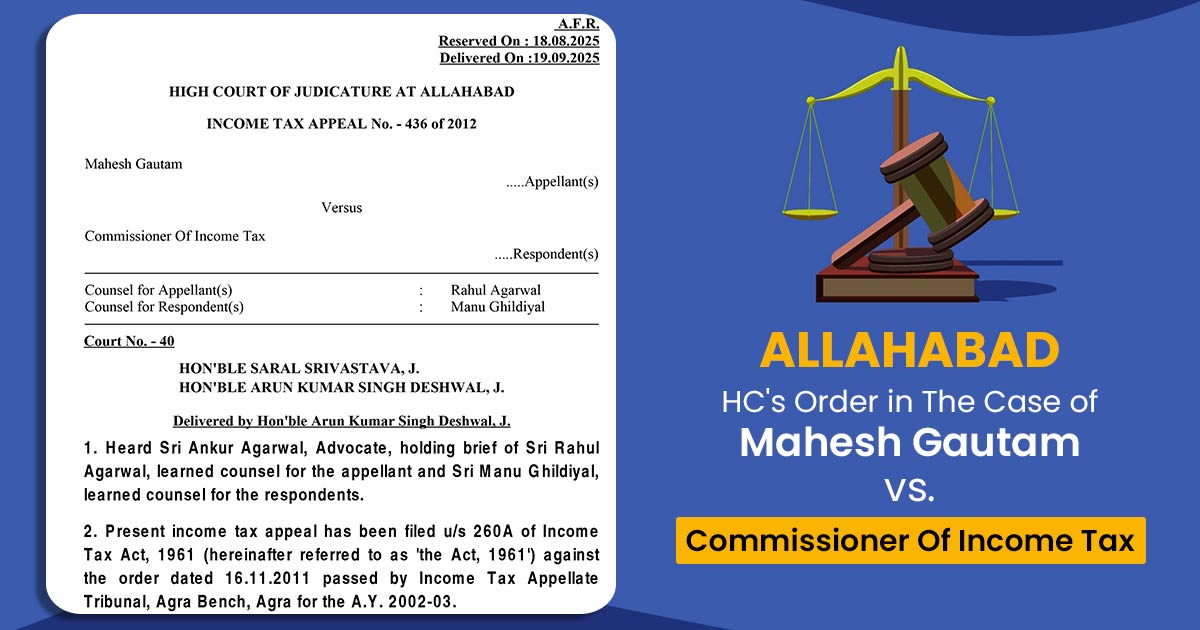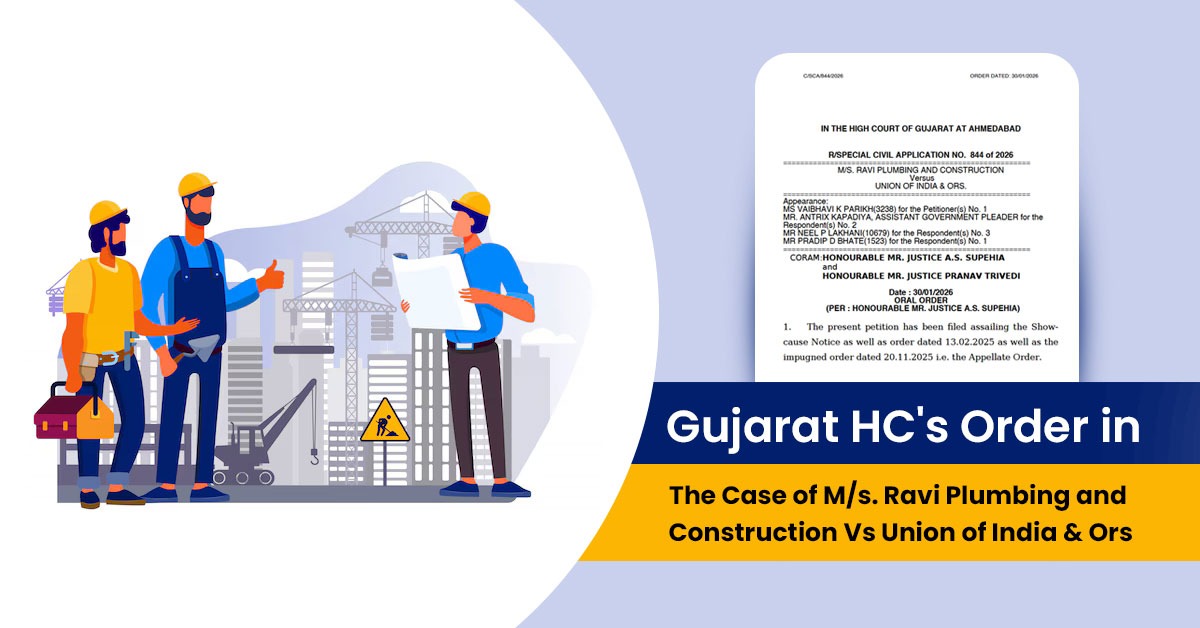
The Allahabad High Court has ruled that notices issued under Sections 148 and 282 of the Income Tax Act, 1961, must be personally served on the assessee through speed post. Simply sending the notice to the assessee’s address does not satisfy the requirement of valid service under Section 27 of the General Clauses Act, 1897.
When the notice is sent via registered post, the notice is delivered to the person it is addressed to; then, the assumption of adequate service emerges, and it is ruled. The court specifying the difference between registered post and speed post, carries that service shall be considered adequate when sent via speed post, merely if it has been delivered to the addressee him/herself and not to a different person.
Section 148 mentions the issuance of notice when the income has not undergone assessment before making a reassessment. It specifies that “the Assessing Officer shall serve on the assessee a notice” mandating the taxpayer to deliver his income returns in the prescribed format.
Read Also: IT Notice U/S 148 Without Modified Process is Invalid: Telangana HC Quashes Reassessment Notice
For the service of notice under the Act, section 282 of the Act is a general provision. It furnishes that the notices or requisitions under the act can be served on the taxpayer either by post or as if it were a summons issued via a court under the Code of Civil Procedure, 1908.
The bench of Justice Saral Srivastava and Justice Arun Kumar Singh Deshwal ruled that
“Section 148 as well as Section 282 of the Act, 1961, clearly state that a notice through post must be delivered to the addressee personally, not simply to his address. Consequently, in the absence of personal service on the assessee, the legal presumption of service u/s 27 of the Act, 1897 and Section 114(f) of the Act, 1872, can only be applied when notice is sent via registered post, not by speed post. Therefore, for the purpose of deemed service u/s 27 of the Act, 1897, for the notice u/s 148 of the Act, 1961, speed post cannot be considered equivalent to registered post. It is appropriate to reiterate that notice sent by speed post, if personally served upon the assessee, then the same is sufficient service as per Section 148 read with Section 282 of the Act, 1961.”
U/s 148 of the Income Tax Act, notices were issued to the appellant for the AYs 2001-02, 2002-03, and 2003-04 through speed post. As the appellant did not submit any return, the notice u/s 142(i) of the Act was also issued, where the date and time of personal hearing were fixed; however, the appellant did not appear.
An Income Tax Inspector was sent to deliver the notices. He said that the taxpayer was not traceable. The assessment proceedings were concluded ex parte, and the order was sent to the appellant’s Rajasthan address, where he received it.
In appeal, the assessment proceedings were quashed by the Commissioner of Income Tax (Appeal)-II, Agra, holding that the notice was not served on the applicant. Department submitted an appeal before the Income Tax Appellate Tribunal, Agra Bench, Agra, wherein it was held that since no envelope had been returned, the notices were served upon the applicant. This order of the ITAT was contested before the High Court.
The Court noted that the notices sent to the petitioner were not returned as recorded by the assessing officer and the first appellate authority, and they were not available in the records.
The court, directing on section 148, ruled that issuance and service of notice u/s 148 of the Act is a precondition for beginning reassessment proceedings.
“From perusal of Section 148 of the Act, 1961, it is clear that notice has to be served on the assessee personally and as per Section 282 of the Act, 1961, notice required under the Act, 1961 may be served on a person either by post or as a summon issued by the court under the Code of Civil Procedure, 1908.”
The definition of ‘Post’ under Section 2(1)(k) of the Post Office Regulation, 2024 encircles registered and speed post, the court said. Under CPC, a summons is not merely required to be sent via registered post to the address, but delivered personally, and in the absence of personal delivery, be affixed.
In registered post, service can be presumed even if there is no evidence of service by invoking Section 27 of the General Clauses Act, 1897, specifying that the conditions articulated therein are fulfilled
Related Post: ITAT: No Penalty Would be Imposed U/S 27(1)(C) as TDS Deducted Under DTAA
“The phrase ‘registered post’ is mentioned in Section 27 of the Act, 1897 cannot be interpreted liberally for the purpose of the income tax act. It is established law that taxing statute has to be interpreted strictly. Thus, the term ‘registered post’ in Section 27 of the Act, 1897 should be understood in reference to the registered post services provided by the Indian Postal department which were initially covered by the Indian Post Office Rules, 1933 (hereinafter referred to as ‘the Rules, 1933’) and is now regulated under the Indian Post Office Rules, 2024 and the Post Office Regulations, 2024,” the Court ruled.
The court, referring to the above-said laws, ruled that registered post is addressee-specific, whereas speed post is address-specific, as in the speed post can be handed to any person at the address; however, a registered post should be handed to the person it is addressed to.
As per the Allahabad High Court in the matter of the taxpayer, the notice was sent via speed post rather than registered post as mandated under the act. Hence, under Section 27 of the General Clauses Act presumption for the service without return of post cannot be made.
It ruled that ITAT had been unable to see the record before returning a finding that notice was served. The notice had not been affixed by the Income Tax Inspector at the taxpayer’s address. As per that, the court ruled that the service was not adequate and set aside the order of the Income Tax Appellate Tribunal.
| Case Title | Mahesh Gautam vs. Commissioner Of Income Tax |
| INCOME TAX APPEAL NO. | No. – 436 of 2012 |
| Counsel For Appellant | Rahul Agarwal |
| Counsel For Respondent | Manu Ghildiyal |
| Allahabad High Court | Read Order |









